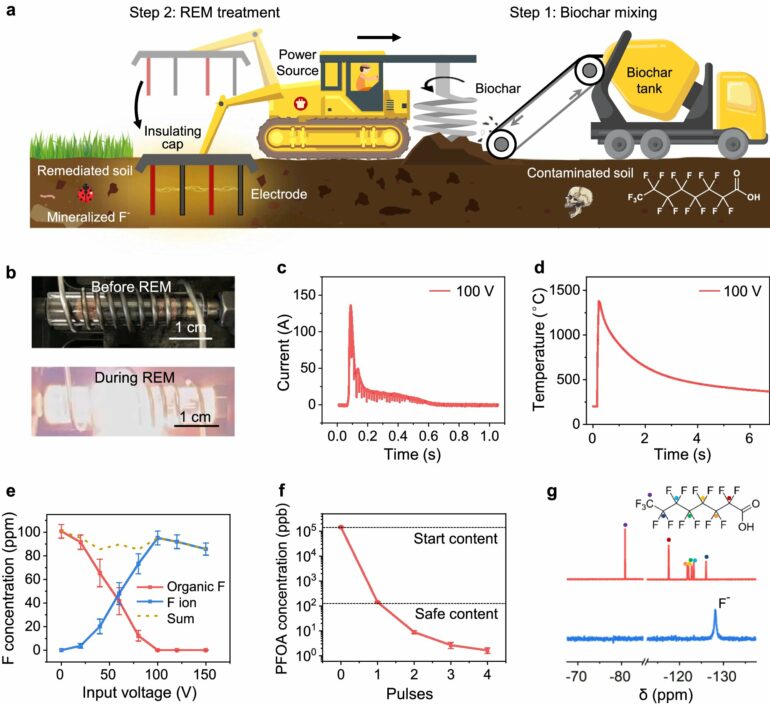Rice University chemist James Tour has led a research team to develop a rapid electrothermal mineralization (REM) process, which in seconds can remediate the accumulation of synthetic chemicals that can contaminate soil and the environment. The study was published in Nature Communications on July 20.
Per- and polyfluoroalkyl substances (PFAS), or persistent and bioaccumulative pollutants that can accumulate in soil, threaten the environment and human health. PFAS, a large group of synthetic chemicals resistant to heat, oil, water and grease, are used in consumer products such as firefighter foam, food packaging, carpeting, cleaning products, paper and paint.
Existing methods for breaking down PFAS are often inefficient, consuming large amounts of energy and water without eliminating these contaminants. The REM process, however, offers a more effective, efficient and environmentally friendly solution.
The REM process uses electrical inserts in the ground plus biochar, an environmentally friendly conductive additive, to rapidly heat contaminated soil to more than 1,000°C in seconds through a direct current pulse. The intense heat converts PFAS into calcium fluoride, a nontoxic mineral, utilizing the natural calcium compounds present in the soil. This method has demonstrated high removal efficiencies (more than 99%) and mineralization ratios (more than 90%).
“Our research shows that this high-temperature electrothermal process can effectively mineralize PFAS into nontoxic calcium fluoride,” said Tour, the T.T. and W.F. Chao Professor of Chemistry and professor of materials science and nanoengineering. “The process retains essential soil properties and enhances soil health by increasing nutrient supply and supporting infiltration of arthropods.”
This breakthrough builds on previous work where electrothermal heating was used to vaporize heavy metals and convert organic pollutants in soil into nontoxic graphite materials. In the current study, the research team mixed soil with biochar and applied a pulsed current, achieving rapid heating and mineralization. The effectiveness of the process was confirmed through advanced testing methods, including liquid chromatography-mass spectrometry and ion chromatography.
The REM process stands out for its speed, efficiency, scalability and environmental benefits. The method reduces energy consumption, greenhouse gas emissions and water use compared to existing remediation practices. The lab-scale process can handle up to 2 kilograms of soil per batch, marking a significant step toward larger-scale, on-site application systems currently being designed.
“This method offers a more environmentally friendly and cost-effective approach to soil remediation,” said Yi Cheng, a Rice Academy Fellow and postdoctoral research associate in the Tour lab. “We are excited about the potential for field-testing and broader deployment in the near future.”
More information:
Yi Cheng et al, Electrothermal mineralization of per- and polyfluoroalkyl substances for soil remediation, Nature Communications (2024). DOI: 10.1038/s41467-024-49809-6
Citation:
Electrothermal mineralization process offers more environmentally friendly, cost-effective method for soil remediation (2024, July 23)


